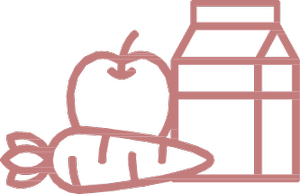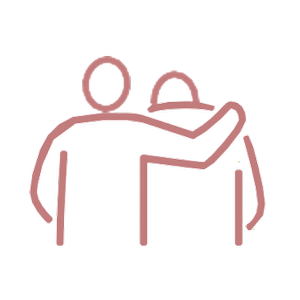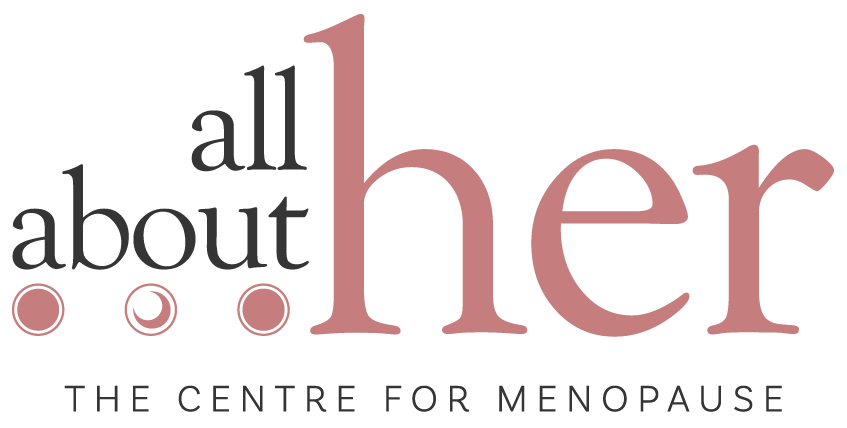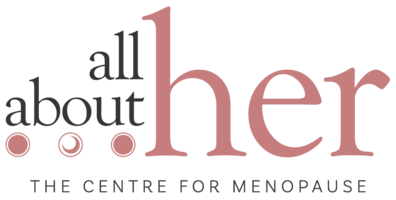Treatment Options for Perimenopause
Menopause is a defining transition for anyone with ovaries* and its symptoms vary substantially among individuals. Comprehensive and holistic menopause management can include lifestyle changes, specific therapies, and various medical and psychological interventions when needed.
While there is no one-size-fits-all remedy, combining treatments can help individuals* find personal relief and improve health and well-being.
Read on to find out more or download the free guide to read later.

Lifestyle changes can play a significant role in managing menopausal symptoms, with evidence suggesting these interventions positively impact the midlife transition:
Healthy Nutrition: Evidence around specific diets, foods and supplements to support perimenopause symptoms is unclear, but there is good research to suggest that an overall healthy diet of mainly unprocessed foods and plenty of fruit and vegetables without excess caloric intake does contribute to overall health and well-being (1),
Tracking symptoms: Tracking in a bid to identify triggers for symptoms like hot flushes is advised. Common triggers include spicy foods, smoking, caffeine and alcohol consumption.
Regular Exercise: Engaging in regular physical activities like aerobic exercises, yoga, and strength training can improve overall well-being, build muscle, and may help reduce the severity of symptoms like hot flushes (2).
Stop or Swap Alcohol: Many notice that alcohol makes their perimenopausal symptoms worse, (mood swings, hot flushes, night `sweats, sleep quality) and there is also evidence to suggest that alcohol consumption is linked to early-onset vasomotor symptoms (3).
Prioritise Sleep: Develop good sleep hygiene habits and self-care which includes periods for relaxation to promote quality sleep and better manage stress.

Lightening the Load: Understanding that perimenopause includes significant shifts around themes of personal and sexual identity, body image, autonomy, ideology, relationship and family dynamics and an opportunity to refocus on our own goals and well-being, the need for both emotional and social support becomes clear.
The support required varies from individual to individual and could include:
Circle of support: rather than try to manage the many potential symptoms of perimenopause in isolation, build a support network from family, friends or community to share challenges and stay connected.
Clear communication: about roles and responsibilities and how your perimenopause experience is impacting you with your partner, family and workplace is key for providing extra layers of support.
Shifting Gears: this is a powerful Rite of Passage, one designed to disrupt and shake our foundations and, invite us to re-evaluate our lives, practice self-compassion and downgrade our self-expectations if energy, stress resilience and emotional bandwidth are impacted.

Medical Treatments for Menopause

Hormone Therapy (HT)
For some individuals, HT is effective for managing symptoms. For others, the use of HT is not advised due to family or personal medical history.
Local Hormone Therapy (HT)
Including vaginal estrogen has been found to be effective in treating the genitourinary syndrome of menopause (GSM) (4)
Non-Hormonal Medications: Antidepressants, anticonvulsants and other medications may offer relief for some perimenopausal symptomsin those whocan’t or choose not to use HT.

Knowing that these medical treatments are not a “magic pill” is important. Whilst a proportion of menopausal individuals describe HT as life changing, the vast majority report HT has reduced their symptoms to a “more manageable level”.

Menopause treatments should be personalised and based on an individual’s specific circumstances, with risks and benefits should be evaluated by a healthcare professional. Combining medical treatments with additional lifestyle interventions and social and emotional support provides more holistic support, honouring perimenopause as not just a physical, but also a psychological and emotional Rite of Passage.

Alternative Therapies
There is evidence to suggest that mind and body methods are safe and effective in treating common menopausal symptoms (physical, psychological and cognitive) and practices like Mindfulness-Based Stress Reduction (MBSR). Yoga and relaxation techniques also show promise in managing these symptoms, particularly assisting those with high levels of stress, nervous system dysregulation and/or sleep challenges (5,6).
A number of complementary medicines and therapies said to relieve perimenopausal symptoms have mixed evidence, and still, some interfere with other medications or therapies, so it is best to consult your healthcare provider before using these.

Psychological Support
When mental health is impacted or exacerbated by perimenopause, support of a menopause-informed mental health professional is advised.
These professionals are experienced in a range of psychological frameworks available to support mental health and the ability to cope with symptoms.
Engaging in psychologicaltherapy can also be helpful for those experiencing mental health issues as well as individuals who are wrestling with their shifting identities, values, relationships, intimacy issues & body image.


All About Her Centre for Menopause is a collective of health professionals for Australian women whose lives are impacted by menopause, and education and training for the psychologists and health professionals who support them.
We exist to ensure that perimenopausal, menopausal and postmenopausal women feel understood, seen and supported at every step along the way.
References:
(1) Yelland, S., Steenson, S., Creedon, A., & Stanner, S. (2023). The role of diet in managing menopausal symptoms: A narrative review. NutritionBulletin, 48(1), 43-65.; (2) Dąbrowska-Galas, M., Dąbrowska, J., Ptaszkowski, K., & Plinta, R. (2019). High physical activity level may reduce menopausal symptoms. Medicina (Kaunas) , 55(8), 466.; (3) Kistler-Fischbacher, M., Weeks, B. K., & Beck, B. R. (2021). The effect of exercise intensity on bone in postmenopausal women (part 2): A meta-analysis. Bone , 143, 115697.; (4) Tomczyk, K., Chmaj-Wierzchowska, K., Wszołek, K., & Wilczak, M. (2023). New possibilities for hormonal vaginal treatment in menopausal women. Journal of Clinical Medicine , 12(14), 4740.; (5) Johnson, A., Roberts, L., & Elkins, G. (2019). Complementary and alternative medicine for menopause. Journal of Evidence-Based Integrative Medicine, 24, 2515690X19829380.; (6) Vaze, N., & Joshi, S. (2010). Yoga and menopausal transition. Journal of Midlife Health , 1(2), 56-58.
*All About Her - The Centre for Menopause acknowledges that all people born with ovaries and who live long enough will experience the menopause transition. This includes cisgender women, transgender men, non-binary individuals, and any other individual with ovaries. We use the terms
individuals/people to be inclusive of the many who do not identify as women, but who will nonetheless experience this significant life stage.
Disclaimer: The information presented is for general understanding only and should not substitute professional medical advice. If you are concerned about your health, talk to your doctor or healthcare team for personalised guidance.
© All About Her Centre 2024
